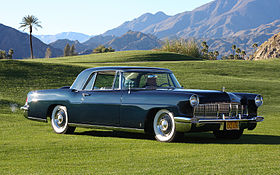| Continental Mark II | |
|---|---|
 1956 Continental Mark II | |
| Overview | |
| Manufacturer | Continental (Ford) |
| Model years | 1956–1957 |
| Assembly | Allen Park Body and Assembly, Allen Park, Michigan, United States |
| Designer | John Reinhart (1953) |
| Body and chassis | |
| Body style | 2-door hardtop |
| Layout | FR layout |
| Related | Lincoln Futura |
| Powertrain | |
| Engine | 368 cu in (6.0 L) 4-bbl. Y-block V8 |
| Transmission | Turbo-Drive 3-speed automatic[1] |
| Dimensions | |
| Wheelbase | 126.0 in (3,200 mm)[1] |
| Length | 218.4 in (5,547 mm) |
| Width | 77.5 in (1,968 mm) |
| Height | 56.3 in (1,430 mm) |
| Curb weight | 5,000 lb (2,300 kg) |
| Chronology | |
| Predecessor | Lincoln Continental (1939–1948) |
| Successor | Continental Mark III Lincoln Continental |
The Continental Mark II is an ultra-luxury coupé that was sold by the Continental Division of Ford for the 1956 and 1957 model years.[2] The first (and only) product line of Continental, the Mark II was developed as the worldwide flagship vehicle of Ford Motor Company.[2] Developed as a successor for the 1939–1948 Lincoln Continental, the Mark II derived its nameplate from European manufacturing practice, denoting a second generation of the model family; Ford would later use this nomenclature for the Mark Series of flagship personal luxury cars.
As the most expensive American-produced automobile of the time, the Mark II was marketed against the Rolls-Royce Silver Cloud and the Bentley Continental.[2][3] Produced solely as a two-door hardtop coupe, the Mark II was largely hand-assembled, sourcing its V8 powertrain from the standard Lincoln line.[2][3]
Following the 1957 model year, the Mark II was discontinued, with the hand-built coupe replaced by a rebranded Lincoln. For 1969, Ford revived the Mark series chronology, debuting the (second) Continental Mark III coupe, leading to five successive generations, ending with the 1998 Lincoln Mark VIII coupe. Alongside its nameplate nomenclature, the Mark II debuted the integrated "Continental" spare-tire trunklid (in place of a bumper-mounted spare tire); each generation of the Mark Series (alongside the 1977–1980 Lincoln Versailles and 1982–1987 Lincoln Continental) used a variation of this feature. The Mark II also debuted the rectangular four-point star emblem, which remains in use on Lincoln-brand vehicles (in modified form) today.
The Mark II was assembled by Ford at Allen Park Body and Assembly in Allen Park, Michigan. Following the discontinuation of the Mark II, the facility was converted to the headquarters of the ill-fated Edsel brand. Today, it remains as the Ford Pilot Plant, where Ford pre-production vehicles are hand-assembled for testing and production development.
- ^ a b Flory, J. "Kelly" Jr. (2008). American Cars, 1946–1959 Every Model Every Year. McFarland & Company. ISBN 978-0-7864-3229-5.
- ^ a b c d Ernst, Kurt (February 11, 2014). "Marketing the Continental Mk II, 'The finest car ever built in America'". Hemmings. Retrieved June 1, 2019.
- ^ a b "1956 Continental Mark II Images, Information and History (Lincoln Continental Mark II, MK2)". Conceptcarz.com. Retrieved December 31, 2011.